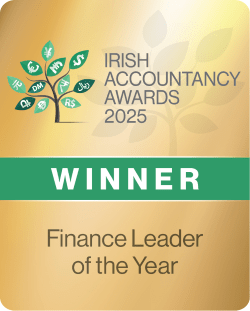As a business owner or entrepreneur, understanding the average cost of an accountant is crucial for effective financial planning and decision-making. Accounting is critical for every firm to keep accurate financial records, stay compliant, and gain strategic insights. However, the cost of hiring an accountant can vary widely depending on multiple factors, leaving many wondering, “How much does an accountant cost?” This guide will help you understand the factors that influence accounting fees, average costs, and how to find a cost-effective accounting solution with fair and transparent pricing.

Factors Influencing Accounting Fees
Unfortunately, there’s no one-size-fits-all answer to the question of how much an accountant costs in Ireland. We’ll discuss different factors that affect costs below. However, having a basic understanding of these factors enables you to compare rates and find an accountant who perfectly aligns with your business needs and budget. Here are some of the key factors that play a role in determining accounting fees:
- Complexity of Financial Tasks:
The more complicated your financial situation or the services required, the higher the accounting fees are likely to be. Complex tax structures, diverse income sources, and international activities may demand more specialist knowledge, which costs more. - Business Size and Revenue:
Generally, larger businesses with higher revenues and more complex financial operations will incur higher accounting fees compared to smaller businesses with simpler financial needs. This is because larger businesses often require more comprehensive services and dedicated resources. - Level of Expertise Required:
The qualifications and experience of the accountant or accounting firm you hire will significantly impact the cost. Certified Public Accountants (CPAs) and accountants with specialised expertise in areas like tax planning, auditing, or business advisory services typically command higher fees than those with more general accounting skills. - Location:
The geographic location of the accounting firm or individual accountant can also influence the cost. Accounting fees tend to be higher in major metropolitan areas or regions with a higher cost of living. - Reputation and Prestige:
Well-established accounting firms with a strong reputation and brand recognition may charge higher fees than lesser-known firms or independent accountants. However, this doesn’t necessarily equate to better service or expertise. - Services Package:
Do you just want compliance or do you want a more hands on engagement which includes bookkeeping, financial reporting and fractional CFO Services
Some Additional Tips
It’s important to take the following into consideration:
- Match Your Business Size to Your Accounting Firm:
If you own a small business, make sure your accountant specialises in it. This connection makes sure that you get the right knowledge and help for your size and needs. - Tailor Your Service Package to Your Business Stage:
Your accounting needs will evolve as your business grows. Initially, you might feel the need for CFO-level guidance but might only afford a year-end compliance service. Use tools like Xero and QuickBooks to access essential financial information in the early stages. - Budget for Accounting Fees:
On average, accounting fees for small businesses range from 1% to 3% of revenue. A year-end compliance service typically costs around 1%, while a fully outsourced bookkeeping, reporting, year-end, and fractional CFO service can go up to 3%. Many small businesses opt to outsource their finance functions to access comprehensive accounting support and reduce the cost compared to maintaining an internal finance team.
Average Cost Of An Accountant
When considering the average cost of hiring an accountant, it’s useful to understand the industry standards and common pricing structures. While prices can vary widely, having a general idea of what to expect can help you budget accordingly. Here’s a breakdown of some typical fee models:
- Hourly Rates:
Many accountants charge hourly rates, typically ranging from €25 to €150 per hour depending on their experience and location. This is a flexible option suitable for businesses with sporadic accounting needs. - Fixed Fees:
Some accountants offer fixed fees for specific services, such as annual account preparation or tax return filing. This provides greater cost predictability, but the scope of services may be limited. - Monthly Retainer:
This model involves paying a fixed monthly fee for a predetermined set of services. Ideal for businesses requiring ongoing accounting support. Retainer fees can vary significantly based on the services included and the level of expertise required.

Accountant Consultation Fees
Many accountants offer initial consultations to discuss your business needs and determine the best path forward. Consultation fees can be structured as a flat fee or an hourly rate, typically ranging from €100 to €200 depending on the accountant’s experience and the complexity of the consultation.
Different Pricing Models For Accounting Services
When it comes to pricing models for accounting services, there are several options to consider. Each model has its own advantages and disadvantages, and the choice ultimately depends on your specific needs and preferences.
Hourly Rates
This is perhaps the most common pricing model for accounting services. Accountants or firms charge an hourly rate for their time spent working on your accounts, financial statements, tax returns, or other tasks. Hourly rates can range from €50 to €200 or more, depending on the accountant’s experience and the complexity of the work.

Fixed Fees
With this model, accountants or firms charge a predetermined fee for specific services or projects. Fixed fees are typically based on the scope of work and the estimated time required to complete it.

Value-based Pricing
This pricing model is based on the perceived value of the accounting services provided, rather than the time spent or the specific tasks performed. Value-based pricing takes into account factors such as the accountant’s expertise, the complexity of the work, and the potential benefits or cost savings for the client.

Considerations For Small Businesses In Ireland
Small businesses in Ireland often face tight budgets when it comes to accounting services. Here are some valuable tips to consider:
- Shop Around:
Before you decide, get quotes from a few different accountants. Inquire about their knowledge, skills, and price for the services you need. - Consider Cloud-Based Accounting:
Cloud-based accounting software simplifies bookkeeping and allows for real-time collaboration with your accountant, potentially reducing service time and costs. - Negotiate Fees:
Don’t be afraid to negotiate fees, especially if you’re a long-term client or require a package of services. - Focus on Value:
While cost is important, prioritise finding an accountant who understands your business needs and provides value beyond basic bookkeeping. Through smart tax planning and financial advice, their knowledge can save you money in the long run.
If you’re looking for personalised accounting services, don’t hesitate to reach out to Around Finance for expert advice tailored to your specific needs.
FAQ
How often should I meet with my accountant?
Meeting frequency depends on your business complexity. However, quarterly meetings are generally recommended to discuss performance and tax deadlines.
Can I negotiate fees with an accountant?
Absolutely! Negotiation is especially possible for long-term clients or when requesting a package of services.
Does location affect the average cost of an accountant?
Somewhat. Accountants in major cities like Dublin or Cork might charge slightly higher rates compared to those in smaller towns.
Should I prioritise cost or value when choosing an accountant?
While cost is important, finding an accountant who understands your business and delivers value beyond basic bookkeeping is crucial. Their expertise can save you money in the long run.
What are the signs that my business might need more advanced accounting services?
Signs include business growth, complicated tax situations, and the need for strategic financial planning and detailed financial analysis.
How can I reduce small business accounting costs?
Outsource, use cloud accounting software, maintain organised records.
Still got questions? Let us know what you’re looking for.











